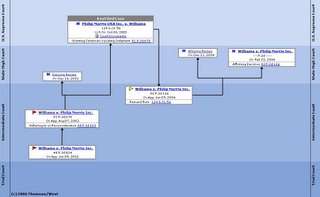[CASE] The Oregon Supreme Court upheld a $79.5 million punitive damage award against a cigaratte manufacturer in favor of a widow whose late husband kept smoking because he believed a company wouldn't sell something that was truly harmful. The company plans to appeal. Law.com - $79.5M Judgment Against Philip Morris Upheld in Oregon
The case is Williams v. Philip Morris Inc., --- P.3d ---, 2006 WL 242456 (Ore. Feb. 2, 2006). This is the latest stop in a long procedural trail:
- Oregon Court of Appeals, 6/5/02 (48 P.3d 824)
- Oregon Court of Appeals reconsideration, 8/7/02 (51 P.3d 670)
- Oregon Supreme Court denying review, 12/24/02
- U.S. Supreme Court granting certiorari, vacating judgment, and remanding "for further consideration in light of State Farm Mutual Automobile Insurance Company v. Campbell, 538 U.S. 408, 123 S.Ct. 1513, 155 L.Ed.2d 585 (2003)," 10/6/03 (124 S. Ct. 56 (mem.))
- Oregon Court of Appeals on remand, 6/9/04 (92 P.3d 126).

The Oregon Supreme Court analyzed the damages using the "guideposts" set out in BMW of North America, Inc. v. Gore, 517 U.S. 559, 116 S Ct 1589, 134 L.Ed.2d 809, Findlaw (1996) (degree of reprehensibility, ratio of punitive damages to compensatory damages, and civil or criminal sanctions for comparable conduct). The Oregon court concluded:
The Gore guideposts are not bright-line tests. * * * Campbell specifically contemplated that some awards exceeding single-digit ratios would satisfy due process. * * * Single-digit ratios may mark the boundary in ordinary cases, but the absence of bright-line rules necessarily suggests that the other two guideposts--reprehensability and comparable sanctions--can provide a basis for overriding the concern that may arise from a double-digit ratio.
And this is by no means an ordinary case. Philip Morris's conduct here was extraordinarily reprehensible, by any measure of which we are aware. It put a significant number of victims at profound risk for an extended period of time. The State of Oregon treats such conduct as grounds for a severe criminal sanction, but even that did not dissuade Philip Morris from pursuing its scheme.
In summary, Philip Morris, with others, engaged in a massive, continuous, near-half-century scheme to defraud the plaintiff and many others, even when Philip Morris always had reason to suspect--and for two or more decades absolutely knew--that the scheme was damaging the health of a very large group of Oregonians--the smoking public--and was killing a number of that group. Under such extreme and outrageous circumstances, we conclude that the jury's $79.5 million punitive damage award against Philip Morris comported with due process, as we understand that standard to relate to punitive damage awards. It follows that the Court of Appeals correctly held that the trial court should have entered judgment against Philip Morris for the full amount of the jury's punitive damage award.
On this side of the Columbia, by the way:
Punitive damages are not allowed in Washington unless specifically authorized by statute. The Washington Supreme Court has continually held that punitive damages are unsound in principle and contrary to public policy.David K. DeWolf & Keller W. Allen, 16 Tort Law and Practice section 5.10 (2d ed. current through 2006 supp.).
Categories: punitive-damages, tobacco, cases

No comments:
Post a Comment